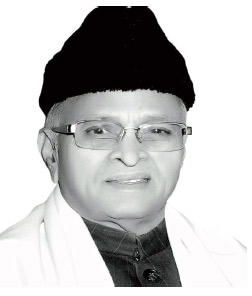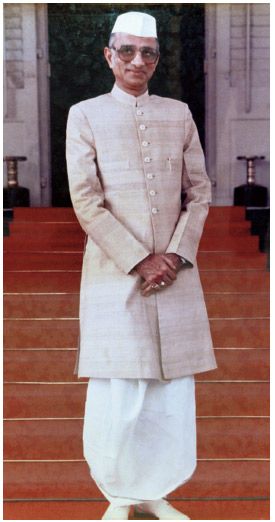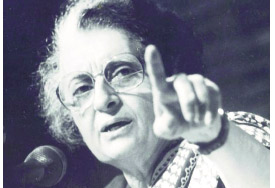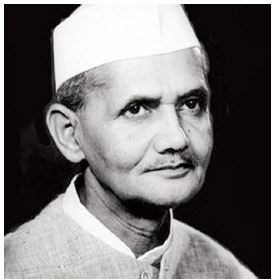Ode to a Gandhian
 GVG Krishna Murthy
Even when most Congress
leaders have discarded
it; he loved his Gandhi
cap, and presented
himself in homespun
khadi as a “simple
Gandhian leading a simple life”, at
home and abroad. Public life minus
politics became his creed in an age
sinecures are much sought after
with regular rounds of 10 Janpath
and 24 Akbar Road.
GVG Krishna Murthy
Even when most Congress
leaders have discarded
it; he loved his Gandhi
cap, and presented
himself in homespun
khadi as a “simple
Gandhian leading a simple life”, at
home and abroad. Public life minus
politics became his creed in an age
sinecures are much sought after
with regular rounds of 10 Janpath
and 24 Akbar Road.
 Bhishma Narain Singh
I met him during this phase of his
life at an award function held at the
Indian Law Institute last year. He
was the chief guest. I was one of the
recipients of the awards on offer.
GVG Krishna Murthy, a former
Election Commissioner, who
chaired the meeting, asked me to
speak.
Bhishma Narain Singh
I met him during this phase of his
life at an award function held at the
Indian Law Institute last year. He
was the chief guest. I was one of the
recipients of the awards on offer.
GVG Krishna Murthy, a former
Election Commissioner, who
chaired the meeting, asked me to
speak.
Like Bhishma Narain Singh, GVG
was a favourite of Indira Gandhi.
She wanted him to contest for the Lok Sabha once. He could not do so
due to a bereavement in
the family.
Bhishma Narain Singh’s first tryst
with the ballot took place in1967
when he was elected to the Bihar Assembly. So with two poll veterans
on the stage, I could not resist the
temptation to remark, ‘Can you win
today’s election with the budget
they had for their first election’.
The
Gandhian readily agreed, said
today’s election arena was not for
‘someone like me’, and regaled us
with anecdotes from his public life.
“How did the bouquet incident
happen”, I asked him. It paved the
way for the resurgence of Indira
Gandhi phenomenon.
“Much has been made about it by
the media”, he remarked and
recalled with relish every aspect of
the ‘story’, which, in a way, was a
tribute to political acumen of India’s
only iron lady.
Bhishma Narain
Singh stood by Indira
Gandhi in her worst
days. As Prime
Minister she
rewarded him with
the key Works and
Housing Ministry in
the run-up to the
1982 Asian Games.
 Indira Gandhi
“Indiraji, you know, was jailed by
the Janata Government’s Home
Minister Charan Singh (in 1978). Yet,
she told me to present a bouquet to
him, when he celebrated his
birthday with great pomp at the
Boat Club lawns. I bought a
bouquet from Janpath market for
Rs.41, I still remember the price, it
was no small money that time.
Indira Gandhi
“Indiraji, you know, was jailed by
the Janata Government’s Home
Minister Charan Singh (in 1978). Yet,
she told me to present a bouquet to
him, when he celebrated his
birthday with great pomp at the
Boat Club lawns. I bought a
bouquet from Janpath market for
Rs.41, I still remember the price, it
was no small money that time.
When I went to the Boat Club
lawns, Charan Singh told the crowd,
“Look. Indiraji has sent me a
bouquet,” and they broke into huge
shouts of Indira Gandhi Zindabad,
Chaudhary Charan Singh Zindabad.
And the rest is history”, he said with
a laugh.
Bhishma Narain Singh stood by Indira Gandhi in her worst days. As
Prime Minister she rewarded him
with the key Works and Housing
Ministry in the run-up to the 1982
Asian Games. Also with the crucial
Parliamentary Affairs Ministry. He
was also the Chief Whip of the
Congress party in 1978, which was a
critical juncture for the Grand Old
Party.
 Chaudhary Charan Singh
‘Do you have any tips to your
present day successors in the Modi
dispensation’, I asked him as he was
about to get into his vehicle to
return home after a long day with
the public.
Chaudhary Charan Singh
‘Do you have any tips to your
present day successors in the Modi
dispensation’, I asked him as he was
about to get into his vehicle to
return home after a long day with
the public.
‘My advice to Modi ministers for
parliamentary Affairs? No advice is
the best advice’, he remarked with a
chuckle. And went into a long
discourse on how parliamentary
affairs minister should conduct on
and outside the floor.
‘Do you know Indiraji was
annoyed when she heard that I was
meeting opposition floor leaders
regularly? I told her that I had to
meet them. I said it was my job.
How can we ensure smooth
functioning of Parliament? She
understood. I never criticised the
Opposition leaders on the floor.
Why should I? I was not like Modi’s
parliamentary affairs ministers. In
fact, I used to arrange regular
interaction between the PM and
other leaders.
Indiraji was a gracious host. She
used to host lunch or dinner for
them. Well, at my request, you see,
the government should keep doors
open, must respect the opposition
even when numbers are on its side
like with Indira Gandhi after the
Janata interregnum’.
Bhishma Narain
Singh followed the
Gandhian
philosophy all his
life; he passed away
into pages of history
on August 1. He was
85. He died of
multiple organ
failure following
high grade B cell
lymphoma with
metastasis.
It is this ability to communicate
and be receptive helped the
Gandhian when he was sent to
Guwahati in 1984 as the Governor
of North-eastern states; Assam was
on the boil over illegal Bangladesh
immigrants into the state. Student
leaders at the forefront of the
agitation made conventional
politicians redundant. Soon, the
uncle born in a family of modest agriculturist means (in Palamau
district in present day Jharkhand on
13 July 1933) and a graduate from
Benaras Hindu University, became
their friend. And paved the way for
the historic Assam Accord Rajiv
Gandhi had signed with Asom
Students Union (ASU).
Bhishma Narain Singh was
Governor of Tamil Nadu when Rajiv
Gandhi was assassinated by a LTTE
suicide bomber at Sriperumbudur.
‘It was a sad day’. He was sent to
Chennai Raj Bhavan by the shortlived
Congress propped
Chandrasekhar government in the
1991.
‘I was not very keen to take up
the post. But the prime minister, a
long-time friend, insisted that I
should …Tamil Nadu needed a
governor as (incumbent) SS Barnala
had resigned. I was told he refused
to recommend dismissal of the
DMK government even as the
Centre wanted it’, he recalled in an
interview with Asian Tribune.
‘When I took over in February
1991, I promised them (TN people)
a popular government within six
months. Fresh elections were held
and a new government under
Jayalalithaa was installed in June,
within four months’. He described
his stint in the state as ‘very good’.
A teetotaller, he travelled
extensively through Asia, Europe,
and Africa besides the US.
He
received several national and
international awards. The
Government of Algeria honoured
him with Medal of Merit and
Certificate of Honour (April, 2005).
Russia bestowed on him its highest
award, ‘Order of Friendship’ in April
2009.
Bhishma Narain Singh followed
the Gandhian philosophy all his life;
he passed away into pages of
history on 1st August. He was 85.
He died of multiple organ failure
following high grade B cell
lymphoma with metastasis.
Malladi Rama Rao




 GVG Krishna Murthy
GVG Krishna Murthy Bhishma Narain Singh
Bhishma Narain Singh Indira Gandhi
Indira Gandhi Chaudhary Charan Singh
Chaudhary Charan Singh